Playing Fallout again makes me long not for Fallout 5, but for a new old-school RPG
Shoot and ask questions in the order of your choice.
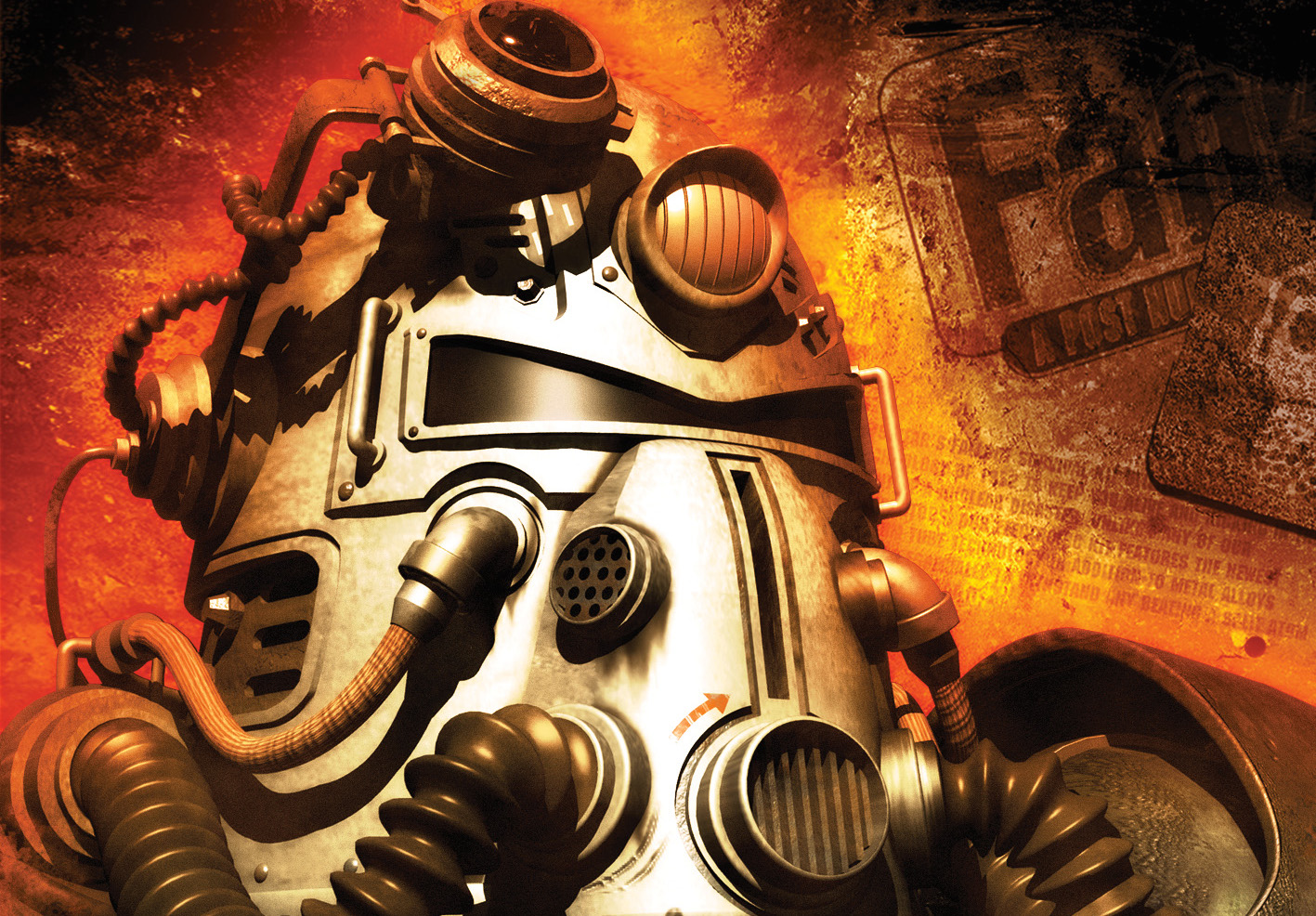
This article was originally published in PC Gamer issue 319. For more quality articles about all things PC gaming, you can subscribe now in the UK and the US.
I’m great at sweet talking people into getting what I want, but surrounded by burly men with big guns, I can’t be too sure of the right thing to say. Without a colour-coded guide, heart symbols or success percentages, a well-intentioned misstep could force me into a gunfight. I’m out of stimpaks and must tread carefully. It’s a typical day in the wasteland.
I played the first Fallout when it was already a classic, and it introduced me to ‘darker’ games—for me, anything without an elven forest or a bloodless death. Its candour about violence, sex and humanity surprised me at the time, but I felt welcomed into the wasteland by the game’s sardonic humour and tongue-in-cheek mascot. That juxtaposition is one of the few still-recognisable elements of the series in its current incarnations. Vault Boy’s confident smile and thumbs-up remain a hilarious reassurance that all is right with a world gone horribly wrong.
This wink to the audience is presented with a far lighter touch in Fallout than I initially remembered. You have to have a keen ability to detect sarcasm and a penchant for reading descriptive text when you examine odd things (they’re not important, but you’re the one who looked) to be in on this joke of a post-apocalyptic life. But once you’re in, you start to see similar contradictions everywhere: in the power struggles of Junktown, the farcical religiosity of the Children of the Cathedral and the simultaneous value and disregard for human life. In a single Fallout quest, you can find cavalier dismissals of others and tender, human moments side by side.
All this is there for you to discover on your own. You’re flung unceremoniously from your Vault on a quest to save it. There’s no quest log, only a sticky note reminding you that people will die in so many days in the same tone that one might use to suggest a partner purchase eggs at the store. Unseasoned Vault Dwellers will quickly run out that clock before they discover half of anything, especially if they never take the time to ask for directions. But like the anarchy of the wasteland it’s set in, a lack of rules or direction also means a kind of freedom.
Free rein
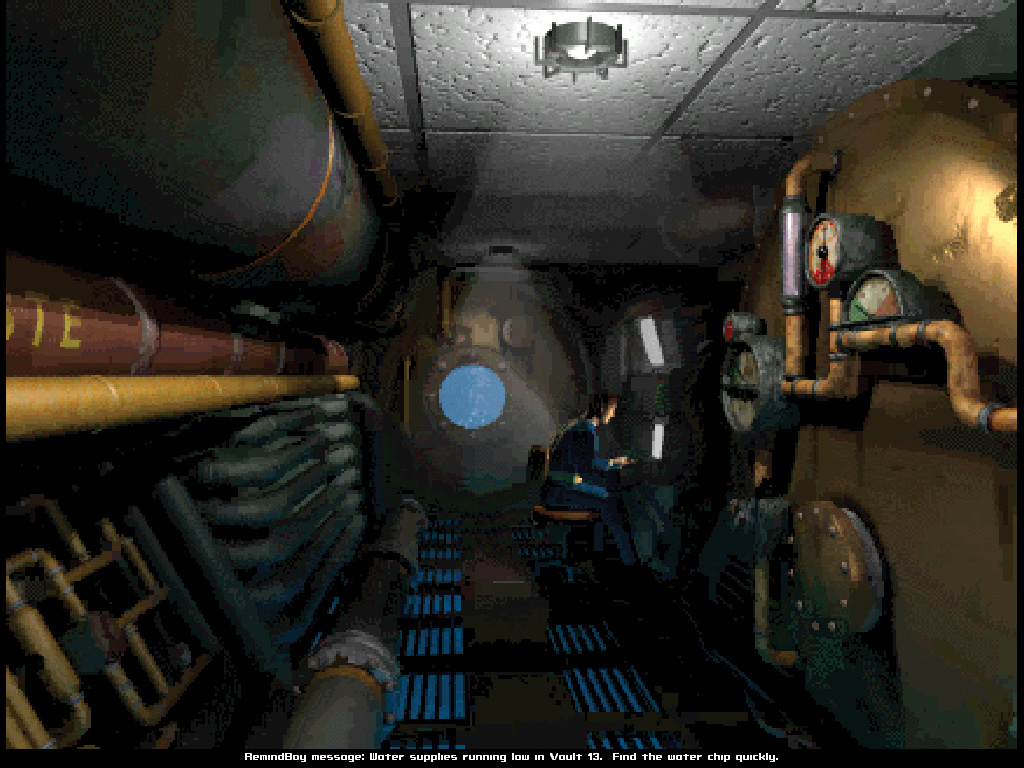
Even revisited, the freedom you’re offered in Fallout is impressive (and at times overwhelming) from the character creation screen onwards. You’re free to distribute your skills however you like, free to tackle much of the game in any order your character build can physically handle and free to interact with those you meet as you see fit. That includes the ability to shoot important helpful characters, whether accidentally or on purpose.
Freedom to fail is one of my favourite elements of Fallout. Forget to holster your gun in a town, and you’ll find yourself in a shootout with half the populace. Answering a question incorrectly can piss off the wrong people and ruin chances with companions, story progression or items. It’s glorious to return to this game armed with prior knowledge and rush for the game’s best moments (hello, Dogmeat!), but I relished the wide-eyed uncertainty as I faced a wasteland full of hostile raiders and shimmering radscorpions.
Keep up to date with the most important stories and the best deals, as picked by the PC Gamer team.
Fallout demands both urgency as Vault 13 runs out of water but also a much slower, deliberate pace than in more recent games. In Fallout 3 and Fallout 4, I jump at the slightest sound—an enormous rat may have snuck up on me, a raider may have me in his sights or an inattentive step may have dumped me into irradiated goop again. The original Fallout blends free exploration with turn-based combat, the latter limiting actions and forcing careful, calculated thought. Swapping weapons takes time, as does reloading them, or even moving a step.
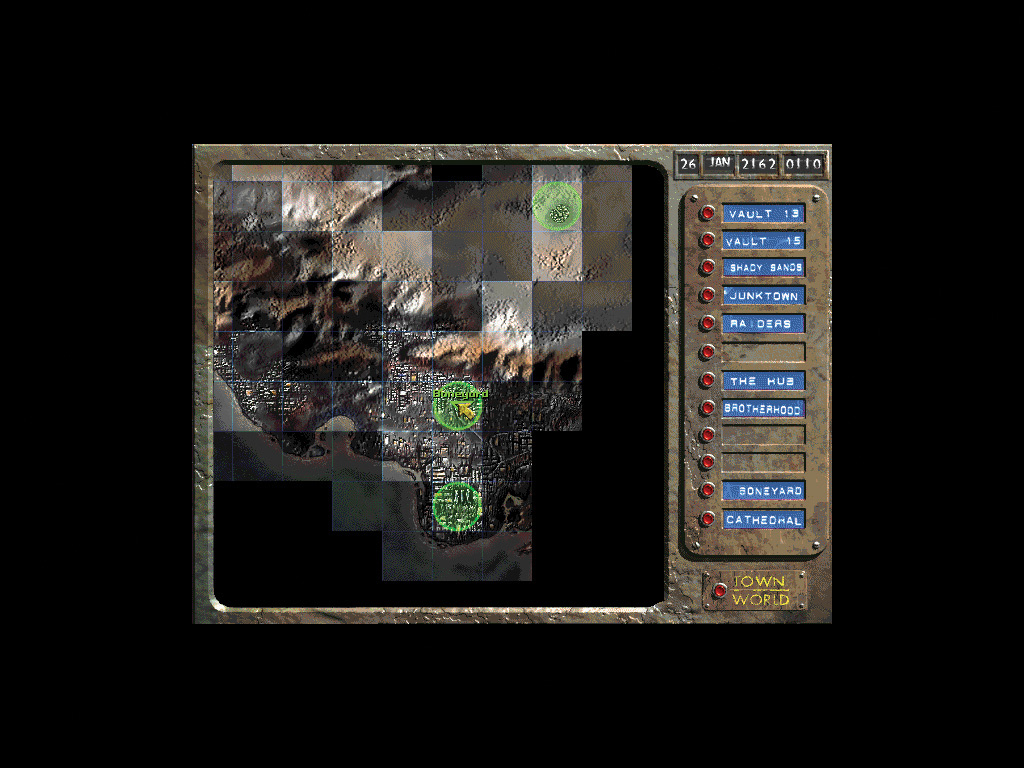
As I remembered the controls, I upgraded from hesitant, stumbling rat fights to fluidly moving in and out of combat, maximising the efficiency of each shot and each step.
Two noteworthy elements of this slower style have survived into the modern games: the SPECIAL system for your stats (with ever-growing complexities to determine how interactions play out) and the VATS system, an evolution of what is, in the first Fallout, a hit chance percentage. Zooming in to choose what parts of an enemy to hit is a poor substitute for more calculated tactics, but it’s a trade-off for real-time gunplay. Both have merits, but that slower pace been left to the ages.
In Fallout’s format, messing about with guns and items presents a pleasant puzzle in the midst of the action. You need the right skills, the right items and the right tactics just to survive the opening minutes of the game. Much of that is either thorough exploration or knowing exactly which lockers to look in for the big guns, or who to barter with and what to offer them. For everything in Fallout, there are right answers which get you exactly what you want, right down to easy exploitation of gambling for infinite money. I prefer to forget these and whimsically fail my way across the wasteland. Radscorpion antidote? Forget it. I’m the Vault Dweller, and I live life on the edge.
Slow burn
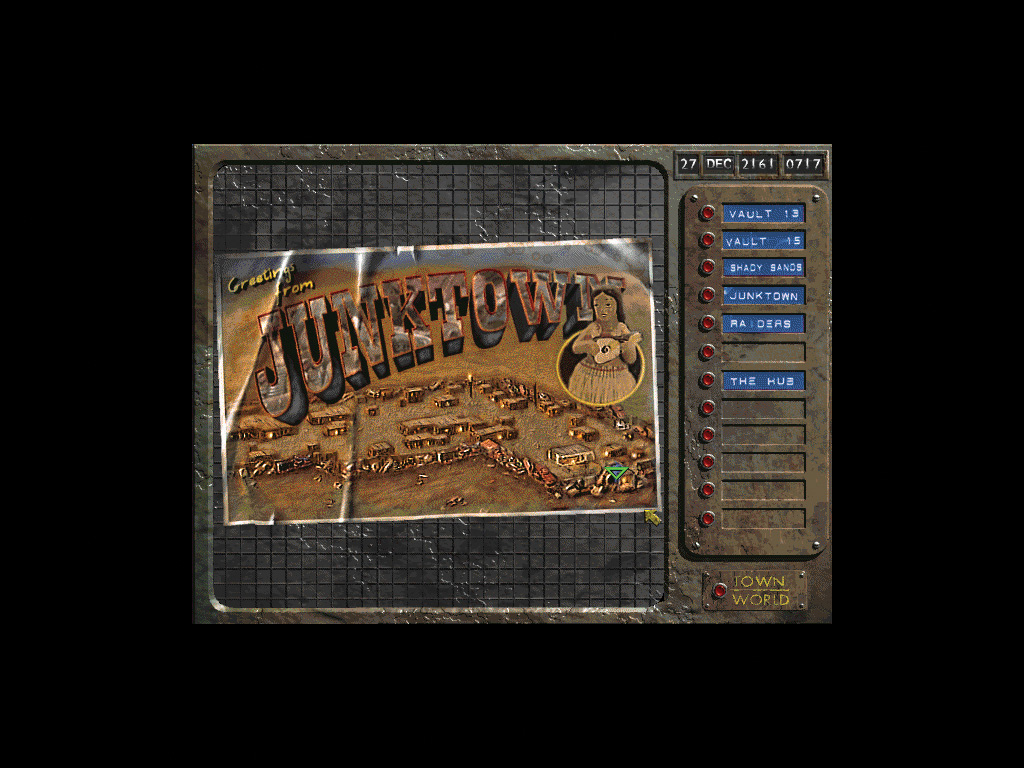
Even out of combat, Fallout takes its time. Cities such as Shady Sands, Junktown and The Hub feel cumbersome to wade through—even when sprinting—and are full of similar-looking NPCs who are difficult to distinguish from the game’s essential characters. Multiple quests in Junktown send you back and forth across three city maps in an onerous march both ways, while others require you to be around at a specific time of day—waiting and watching as the clock continues to tick down on your friends in Vault 13. Rather than feel like an annoyance, though, it’s another wonderful example of Fallout’s beautiful contradictions. To ‘rush’ to your goals, you must move slowly and methodically, even as cutscenes at certain intervals warn you of your deadline, whether that deadline is water loss or something altogether more sinister.
This slower, vague approach that plays fast and loose with objectives and possible endings makes me wax nostalgic for this style of play. Modern Fallout’s action-oriented sensibilities emphasise the danger of a post-apocalyptic city, but old Fallout’s empty map with its shadowy edges gives me a renewed appreciation for what freedom means in such a world. I enjoy the ‘well, screw it’ whimsy of trying to navigate conversations with potentially hostile parties sans dialogue wheels or percent indications of how my response will affect them. Some may like to be able to plan their approaches, but there’s a realism to the volatility of human interaction that’s admirable here. And that freedom to fail opens the door to multiple endings as rewards not for playing a morality system correctly or finishing a certain amount of sidequests, but as an organic result of how you actually played the game.
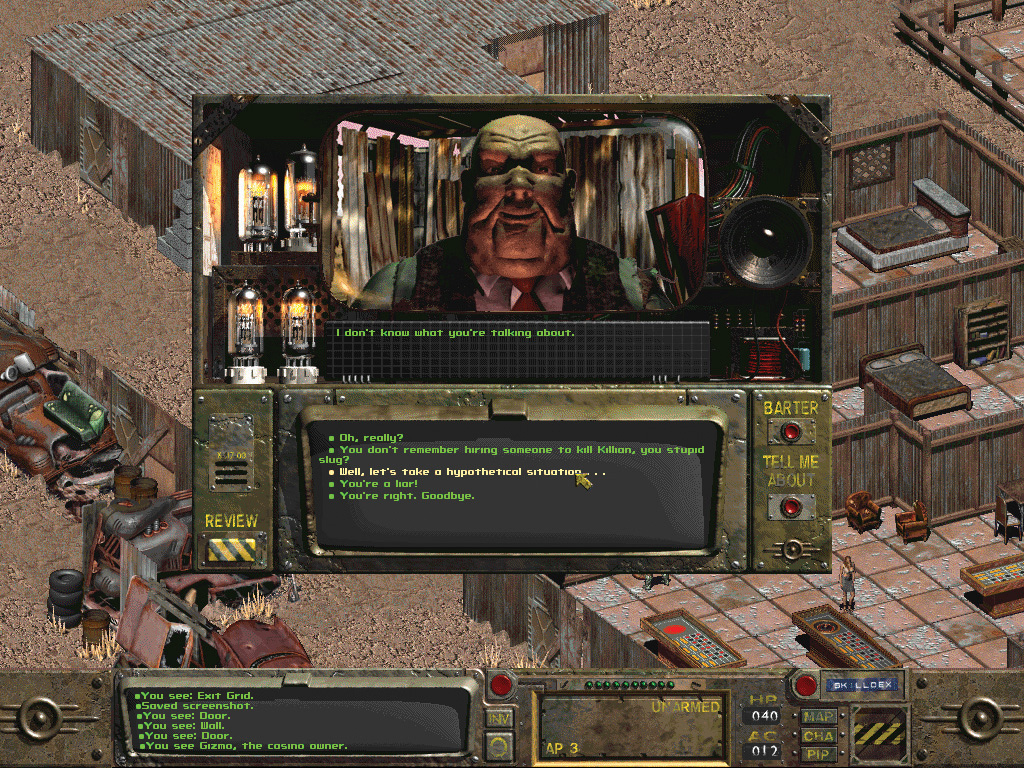
It’s unlikely that any Bethesda-made Fallout would return to these open-ended roots. We no longer have time for the exasperating opacity of the first Fallout’s strange, yet efficient, control scheme, nor are we interested in taking five long, slow-moving turns to bring down a giant rat. The quirks of the original game have thus stayed in the past. Playing Fallout again makes me long not for Fallout 5, but for…well, another old-school Fallout. I want another vision of the wasteland that doesn’t lay everything out for me, and forces me to once again confront the unknown with nothing but a Pip Boy, a stimpak, and a vague direction across the desert. I don’t think I can look to the future of the series for such a game, so revisiting the Fallout of the past is my only recourse.
But I still have Dogmeat in the future, so perhaps all is right with the world after all.

